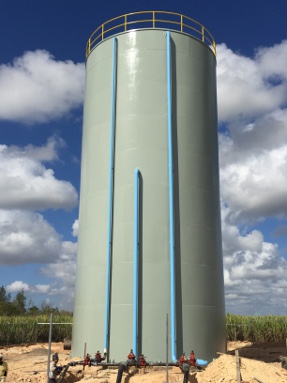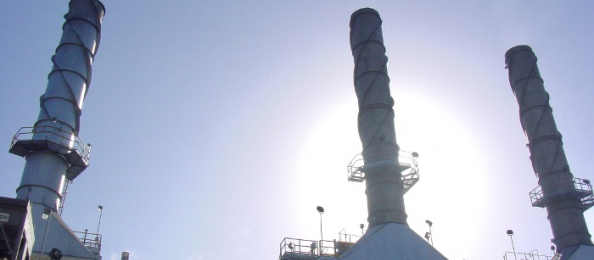The electrostatic precipitators installed in the boiler system of the mill almost completely reduces the emission of solid particles. Photo: Central Romana
Investing in the Community
Moving forward with firm steps toward its commitments on corporate social responsibility, Central Romana Corporation, Ltd., has concluded its work of reorganizing and improving Batey Cacata, one of many agricultural communities in the Dominican Republic that harvests sugarcane. These measures involved an investment of more than $5 million and are part of a model pilot program that will be extended to all the bateys within the agricultural division of the company.
As a first step, Central Romana’s engineers designed a complete sanitary infrastructure that included a permanent supply of potable water, a new sewer system, and also wastewater management for all the housing projects in the rural community of Batey Cacata. To achieve this goal, the company built an aqueduct with a pumping station that can provide potable drinking water from two wells and fill a 100,000-gallon stainless steel tank as fast as 100 gallons per minute.
All of the families that live in Batey Cacata, which was improved and expanded with new housing facilities, have access to water taps for drinking, cooking, and personal hygiene. Water distribution is available for interior use as well as common shared access, including latrines with continuous water discharge, shower heads, and sinks. The new sewer system re-collects all of the generated wastewater to ensure the welfare and health of the population. It operates with gravity, channeling and discharging the wastewater into an open treatment plant. The water in the aqueduct is purified by the oxygen produced through photosynthesis. This type of natural treatment under controlled conditions is the most appropriate technology for rural areas where large extensions of land are available.

At the same time, existing green areas in the Batey Cacata were upgraded and new ones were created with the planting of fruit trees such as the breadfruit, avocado, Dominican cherry, soursop, and mango trees as well as others such as palm, dove, and neem trees. The inhabitants of the bateys also have the option to farm a small piece of terrain near the houses they occupy, where they can harvest short-cycle vegetables and other plants.
Over the course of 5 to 10 years, Central Romana will rehabilitate and improve the properties of the sugarcane communities, taking as its model the investment made in the new Batey Cacata and replicating it in each batey according to need.
In another important step toward its corporate social responsibility program, Central Romana has managed to reduce the level of emissions of solid particles into the atmosphere by more than 90 percent with the installation of electrostatic precipitators in their boiler systems during the production of sugarcane from the mills. Its goal is to filter the tiny particles more efficiently through a process of ionization that significantly reduces pollution. The company has stated publicly that it has invested more than 2.5 billion pesos into this operation over a period of three years. With these measures, they are advancing in their commitment to protect the environment, in accordance with the laws established by the Dominican government. This important investment made by the company seeks to reduce the environmental impact of industrial processes and, at the same time, is a significant advance in technical progress that has been achieved by the plant engineers.

In terms of human development, and in response to their human resources, Central Romana continues to strengthen benefits for its personnel by providing healthcare, quality schools for the children of employees, and labor agreements through its United Workers Union. In that regard, a new collective agreement on work conditions was signed in 2016 between Central Romana and its United Workers Union that includes a wage increase of 18 percent over the course of three years.
The new agreement runs until 2019. It has a similar proportion of increases in benefits regarding annual bonuses, Christmas bonuses, holiday incentives, as well as increases of between 15 and 23 percent in the payment of allowances for workers, improvements in training and staff development plans, as well as educational programs for the children of employees. In this new pact, programs for accident prevention and occupational diseases are being strengthened. There have been increases of more than 30 percent for social programs that favor workers, for example the death of family members, and wage increases of between 25 and 66 percent for marriages and the birth of children.
For more than 50 years, Central Romana has promoted the freedom of association of its workers and employees, thereby achieving an effective work environment as well as important mutual benefits for both workers and the company.
About Us // Privacy Policy // Copyright Information // Legal Disclaimer // Contact
Copyright © 2012-2018 macondo publishing GmbH. All rights reserved.
The CSR Academy is an independent learning platform of the macondo publishing group.









